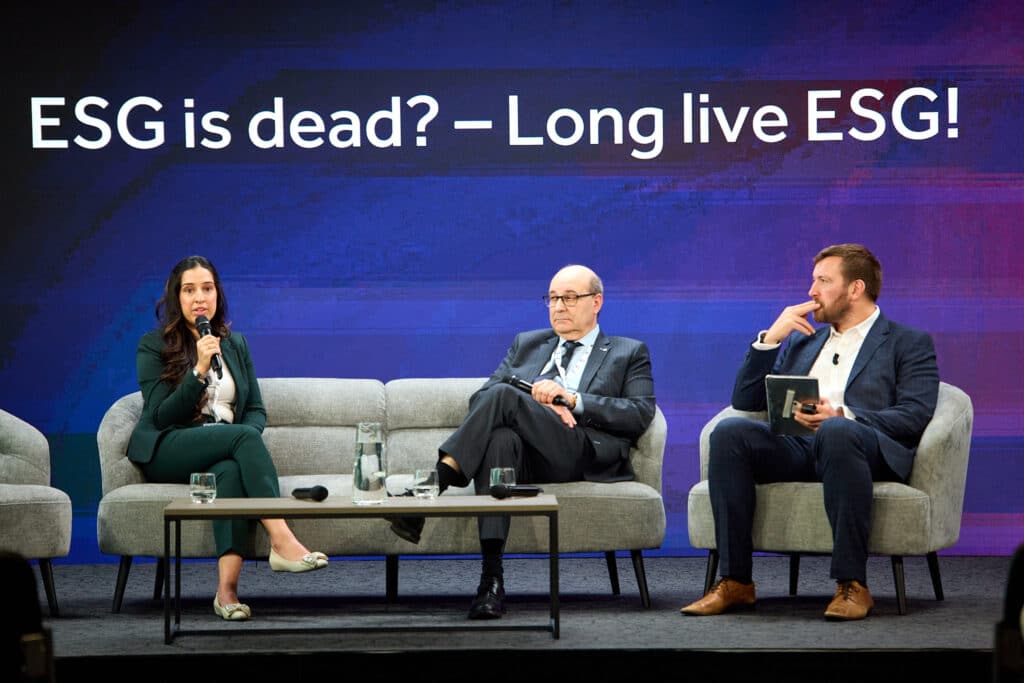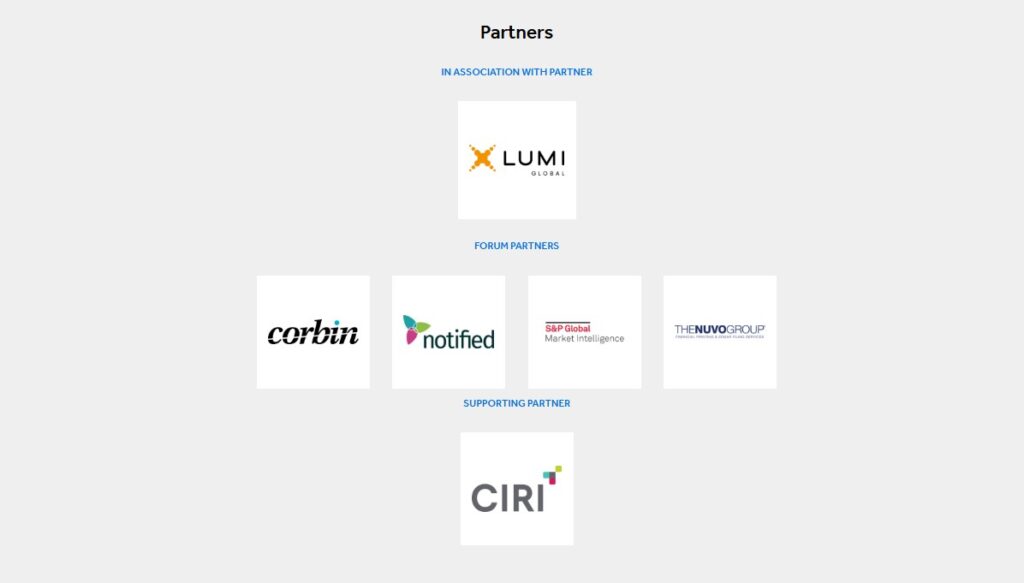Debate at the IR Impact Forum – Canada 2025 put a spotlight on the views that make up each side of an increasingly politicized area of IR
Whether ESG is over or increasingly relevant, in need of reform or greater standardization is the great debate. Has the term become too ‘woke’? Is it too much of a political hot potato? Does good ESG equate to better share price performance, or has it been hijacked under the pretense of improving returns?
These were the topics up for debate when Prabh Banga, vice president of sustainability at Aecon Group and Jack Mintz, president’s fellow of the school of public policy at the University of Calgary took to the stage at the IR Impact Forum – Canada in April.
Although the two come to ESG from opposing sides – IR Impact’s head of content and session moderator Steve Wade described Banga as someone who ‘lives in the sustainability world, so is much more bought in and pro ESG’ and Mintz as someone with ‘thoughts around where it might be difficult’ – there were many points of agreement, from the problems with ratings to materiality being key.
Here’s five things we learned from the debate: ESG is dead? Long live ESG!
1. ESG means different things to different people. Perhaps what divides opinion on this topic most is simply that ESG represents such different things to different people. Wade kicked off the discussion by asking Banga and Mintz what the term represents to each of them.
Mintz said he feels ESG often goes beyond the formal environment, social and governance definition, adding that ‘whether they’re relevant or not is another story’.
Having served on a number of corporate boards, he continued that it is his experience that ‘in the end, climate change and diversity are probably the two most important issues that tend to get focused on with ESG. A lot of the other stuff tends to be either fluff or has some relevance to some companies.’
He later added that, in his view, it really comes down to the question of whether ‘ESG reporting ends up improving the returns that shareholders get. The literature is pretty consistent on this,’ he said. ‘Returns are not very much affected by ESG details.’
For Banga, ‘whether you call it ESG, sustainability, corporate sustainability. CSR [those are simply] different ways to communicate the same thing’.
For her, ESG is a risk-management mitigation tool. ‘It helps companies seek out opportunities in those areas,’ adding that what is most relevant and material ‘really depends on the company and the industry.’
2. And it must be about the materiality. Despite their differing views, both Banga and Mintz agreed that materiality is key to any future for ESG.
‘One of the key points about ESG – and I can’t stress the importance of this enough – is materiality,’ said Banga. ‘Traditionally, when it was called CSR, there was this approach to it being a focus on philanthropy. Since then, it has evolved. And really sustainability should be seen as a value add to your company.
‘Just as you would evaluate any other initiatives in your company by asking how that supports the bottom line, how that generates value, what value it brings to your shareholders, you need to bring the same business case to sustainability as well,’ she said.

‘One of the criticisms of ESG has been that companies are encouraged to report on everything under the sun and, as we know, there’s so many different topics under ESG,’ continued Banga, who had previously talked about the idea of the ESG alphabet soup. ‘But it is moving towards the concept of materiality – really encouraging companies to focus on the issues that are important to them. And that is determined through stakeholder engagement.’
3. Which is where standardization comes in. Banga argued that greater standardization is needed for ESG to move forward as a materiality consideration – but that isn’t about ESG ratings, something she and Mintz agreed were confusing and muddied the landscape rather than providing clarity. ‘When I’m talking about standardization, it’s not about subscribing to frameworks or rankings,’ stressed Banga. ‘It’s looking at the way that ESG metrics are measured, just like IFRS and other accounting and financial frameworks. There’s standardization across financial reporting. There’s standardization against reporting on safety. Similarly, I think that there’s a place for standardizing certain ESG metrics as well – like measuring greenhouse gas emissions.’
4. But social norms change – which makes some metrics harder to standardize. Standardization might work for some metrics, butMintz argued that other areas currently under the ESG umbrella are included to quick change. He pointed to shifting social norms as an example of how the nature of these risks and opportunities can change quite quickly.
Pointing to the way that DEI entered into hiring practices and broader ESG frameworks following the murder of George Floyd in May 2020, Mintz said: ‘Now, we’re getting a complete revision of that, where people recognize that diversity is important in the sense of having a society that’s diverse and certainly in drawing the very best people from this diverse society to work in your organization. But people are now starting to say, Well, we’ve got to remember there’s merit and we have to have an emphasis of bringing in the best qualified individuals.’
Another example he offered is the uptick in defense spending around the world. Mintz commented that, with so many funds – including NBIM, the world’s largest SWF – omitting defense firms, investors interested only in getting the best returns possible ‘might be very angry with somebody who says, I’m not going to invest in [these] companies that are probably going to end up with extremely good returns, as we build up these defense opportunities’. While Mintz stressed his sadness around what he described as ‘the end of peace dividend,’ he said these were examples of how easily ‘what we might think is standard now’ can change. ‘We get these shifts in society and that’s part of the problem with standardization.’
5. ESG probably isn’t going anywhere. Whether it gets rebranded, how it is covered by regulation or pushed by investors, it seems unlikely that ESG is on the way out. Despite his skepticism, Mintz pointed to the long life the concept has already enjoyed: ‘I have to admit, before ESG ever became popular and discussed, I was on corporate boards where we had disclosure documents that went through a lot of risks that could impact on our financial returns – and they were fully revealed to shareholders [just] without calling them ESG.’
Banga advised IROs to cut through the hype. ‘Although we see in the headlines that people are moving away from alliances like the Net Zero Alliance, a study done by PwC in 2025 called the State of Decarbonization talks about how ESG is actually quite different than what we’re hearing in the headlines. It’s not a story of retreat, it’s a story of silent, consistent action and executives doubling down on actions related to sustainability with a real focus on efficiency, innovation and driving long-term value for the company.’







